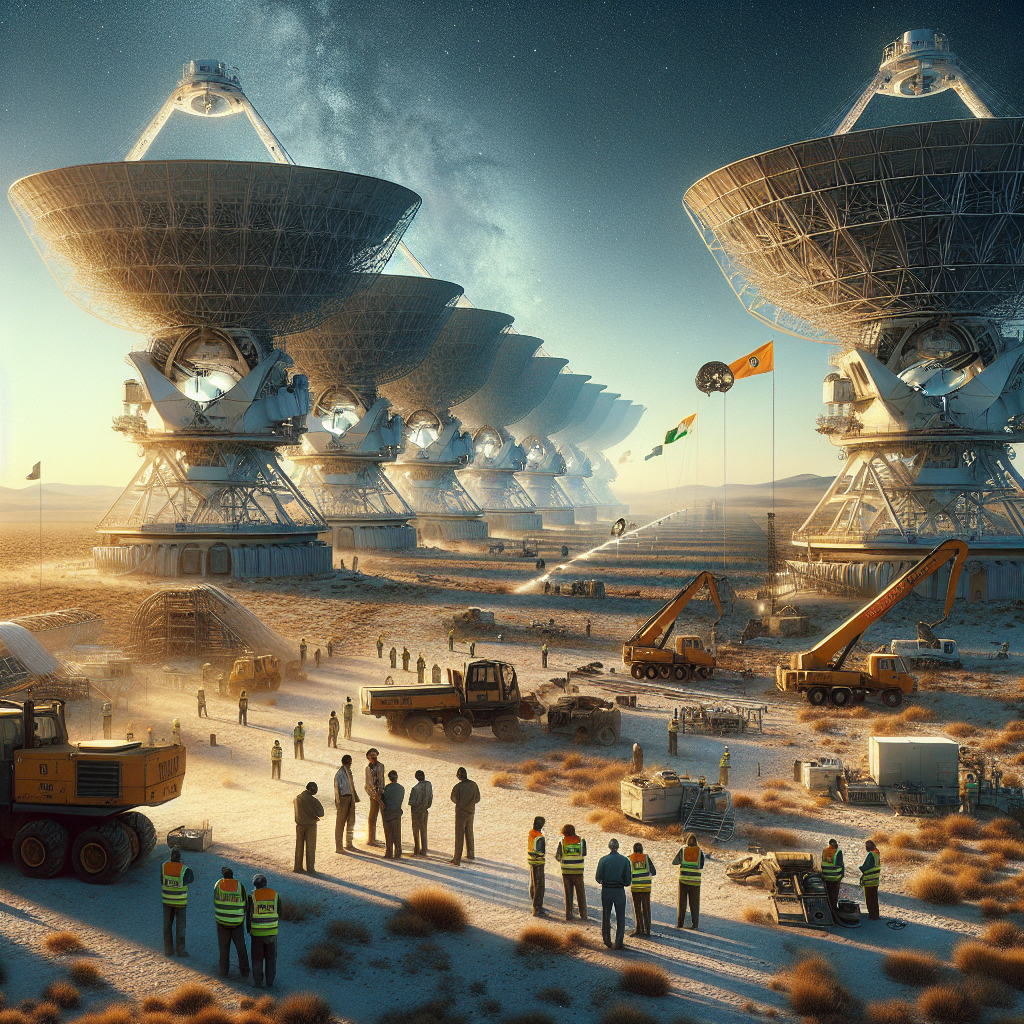
“`html
India’s $228 Million AUD Commitment to SKAO: A New Era of Astronomy
The Square Kilometre Array Observatory (SKAO) is set to change the landscape of astronomical research with the help of India, which has pledged a significant $228 million AUD towards the project. This collaboration positions Indian astronomers at the forefront of groundbreaking discoveries. At a recent event at the National Centre for Radio Astrophysics (NCRA) in Pune on November 13, 2024, India’s membership was celebrated, marking a major milestone in international scientific cooperation.
Historical Event at NCRA
The formal ceremony saw the presence of eminent personalities, including Dr. Ajit Kumar Mohanty, Secretary of the Department of Atomic Energy (DAE), and Prof. Abhay Karandikar, Secretary of the Department of Science and Technology (DST), alongside SKAO’s Director-General Prof. Philip Diamond CBE. The historic event further highlighted the participation of academic and industry partners involved with the SKA-India Consortium (SKAIC).
India Joins as a Founding Member
On July 2024, India joined the SKAO Council as a member by ratifying the founding document, the Convention Establishing the SKAO. By investing ₹1250 crore (or $228 million AUD), India has asserted its role in supporting activities of the SKA project until 2031. This collaboration is seen as a testament to India’s leadership in radio astronomy, amplified by its strong tradition of excellence in research and technological capabilities.
The SKAO Project: A Global Scientific Endeavor
The SKAO is designed to bridge continents and communities through unprecedented radio astronomy research. Headquartered in the UK, it encompasses two major telescope sites, one in South Africa and another in Australia, alongside support facilities worldwide. With India’s inclusion, 12 nations now participate in overcoming monumental cosmic mysteries.
Nobel Laureate Prof. Brian Schmidt Comments
Prof. Brian Schmidt, Nobel Laureate in Physics, praised India’s involvement: “It’s exciting to see India join the SKA Observatory given its long history of radio astronomy excellence.” He emphasized that Indian astronomers are set to be at the center of many upcoming SKAO discoveries, catalyzing technological advancements and inspiring new ventures.
- The SKAO links global stakeholders and shares profound socio-economic benefits by fostering innovation and collaboration.
- India had an instrumental role in creating the SKAO, contributing to its founding and ongoing governance.
Technological Contributions and National Pride
Prof. Abhay Karandikar of DST noted that India’s expertise in radio astronomy and software development is vital for the SKAO’s success. The country will make in-kind contributions across digital and processing platforms, reinforcing its prominent role in global scientific research.
Dr. Ajit Kumar Mohanty described the collaboration as a momentous achievement: “This international collaboration places India at the forefront in the field of mega-science international projects.”
Growth in Indian Research
The SKA-India Consortium (SKAIC) comprises 24 institutions working towards maximizing India’s contributions to the project’s technical aspects, software, and governance. NCRA-TIFR, the nodal institute, spearheads this collaborative effort.
The Road Ahead: Groundbreaking Science and Forward-Thinking Innovation
Plans are underway to establish an SKA Regional Centre (SRC) in India, providing local scientists direct access to SKAO data for analysis and research. Already, Indian researchers chair several of SKAO’s scientific working groups, underscoring a solid presence in critical global discussions.
Prof. Pankaj Jain of IIT Kanpur Shares Insight
Prof. Pankaj Jain emphasized the inclusion of students in SKAO’s vast research field, encouraging a wave of educated youths in pioneering radio astronomy. This not only enriches educational frameworks but also strengthens international scientific relations.
Looking Forward: Detailing SKA-Low’s Potential in Australia
Dr. Sarah Pearce highlighted the groundbreaking work of the SKA-Low telescope in Western Australia, a project Australia co-champions with SKAO. These telescopes are expected to fast-track discoveries previously unexplored, mapping vast spans of the cosmos with unparalleled precision.
India’s role is substantial in realizing the potential of radio telescopes that act as ‘time machines’ to provide fresh insights into celestial phenomena and enhance our understanding of the universe.
A United Global Effort in Astronomical Research
The SKAO reiterates the value of international scientific collaboration, pushing towards shared goals and creating platforms for domestic innovations. Indian involvement highlights the wealth of knowledge and leadership that the nation brings, cementing its status in the global scientific forum.
India’s continuous investment and leadership are fuelling the SKAO’s mission, ensuring that powerful radio telescopes deliver invaluable cosmic insights for decades to come.

